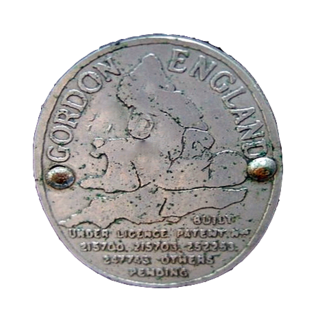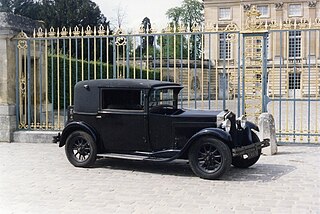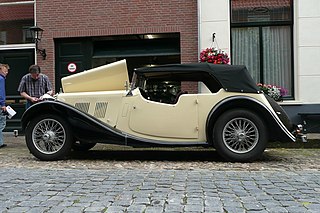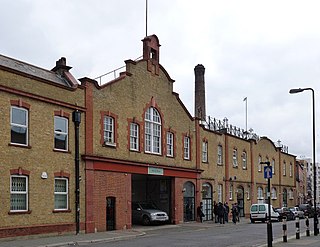
Minerva chassis
The Cunard Motor & Carriage company was a British vehicle coachbuilder. It was founded in London in 1911 and continued in various forms up to the 1960s. [1]

The Cunard Motor & Carriage company was a British vehicle coachbuilder. It was founded in London in 1911 and continued in various forms up to the 1960s. [1]
The main customer for the bodies was Napier & Son and from its works in Lower Richmond Road, London, SW15 Cunard provided a range of coachwork to fit on Napier chassis. Shortly after its formation, Cunard became a subsidiary of Napier and acted as their in-house coachbuilder but continued to supply bodies to other companies.
In 1924 Napier stopped making cars and the Cunard business was sold to Weymann Motor Bodies Ltd [2] who were looking for premises in which to build their range of car bodies. The Cunard name was dropped. [1]

The name was revived in 1930 by an ex Cunard managing director, R. I. Musselwhite and V. E. Freestone from another well known coachbuilder, Thrupp & Maberly. New premises were opened in Acton in West London. In 1931, after only a few bodies had been made, the company was bought by the London agent for Morris cars Stewart and Ardern and both Musselwhite and Freestone left. Production was now concentrated on a range of standard bodies for Morris, Rover and Wolseley (especially the Hornet model).
With the decline in the specialist coachwork business as car makers increasingly turned to mass-produced, pressed steel bodies, Cunard moved into commercial vehicle bodies. The name was changed to Cunard Commercial Carriage Company and a move made to Water Road Alperton Wembley in North London where it Was run by Mr Freeman As Works Manager and Mr Fred Winyard in overall. control General Foreman was Mr Ron Greensheilds. During the early 60s a number of Morris Minis were modified by lowering the suspension, the roof height and replacing All the glass with Perspex. The company continued into the late 1960s

A coachbuilder or body-maker is a person or company who manufactures bodies for passenger-carrying vehicles. Coachwork is the body of an automobile, bus, horse-drawn carriage, or railway carriage. The word "coach" was derived from the Hungarian town of Kocs. A vehicle body constructed by a coachbuilder may be called a "coachbuilt body" or "custom body".

Duple Coachbuilders was a coach and bus bodybuilder in England from 1919 until 1989.
The Whitlock company, based in London, England, started as a carriage builder in 1778, moved into the car industry in 1903 and finally closed in 1991.

Thrupp & Maberly was a British coachbuilding business based in the West End of London, England. Coach-makers to Queen Victoria they operated for more than two centuries until 1967 when they closed while in the ownership of Rootes Group.

Gordon England was a British coachbuilding company based in Putney, South West London and later in the Palace of Industry, Wembley, North London with a showroom at 28 South Molton Street, Mayfair, London W1.
The Grose was an English automobile built between 1898 and 1901, Grose also built bodies for cars, buses, ambulances and commercial vehicles until the late 1950s.

Charles H Roe was a Yorkshire coachbuilding company. It was for most of its life based at Crossgates Carriage Works, in Leeds.
Abbott of Farnham, E D Abbott Limited was a British coachbuilding business based in Farnham, Surrey, trading under that name from 1929. A major part of their output was under sub-contract to motor vehicle manufacturers. The business closed in 1972.
Mulliners Limited of Birmingham was a British coachbuilding business in Bordesley Green, with factories in Bordesley Green and Cherrywood Roads. It made standard bodies for specialist car manufacturers. In the 19th century there were family ties with founders Mulliners of Northampton and the businesses of other Mulliner brothers and cousins but it became a quite separate business belonging to Herbert Mulliner.

Weymann Fabric Bodies is a patented design system for fuselages for aircraft and superlight coachwork for motor vehicles. The system used a patent-jointed wood frame covered in fabric. It was popular on cars from the 1920s until the early 1930s as it reduced the usual squeaks and rattles of coachbuilt bodies by its use of flexible joints between body timbers.

J Gurney Nutting & Co Limited was an English firm of bespoke coachbuilders specialising in sporting bodies founded in 1918 as a new enterprise by a Croydon firm of builders and joiners of the same name. The senior partner was John (Jack) Gurney Nutting (1871–1946).

Freestone and Webb were English coachbuilders who made bodies for Rolls-Royce and Bentley motor cars but also built bodies on other chassis including Alfa Romeo, Packard, and Mercedes-Benz.

Barker & Co. was a British coachbuilder, a maker of carriages and in the 20th century bodywork for prestige cars, including Rolls-Royce, Bentley, and Daimler.

Jarvis & Sons Limited were South London-based motor dealers for Morris and MG, and latterly coachworks providing special bodies for various car chassis until after World War II.

Charlesworth Bodies Limited of Much Park Street, Coventry, owned a coachbuilding business that had been founded in 1907 by Charles Gray Hill and Charles Steane.

The Lancefield Coachworks Limited was a builder of bespoke bodies for expensive car chassis always introducing sporting elements into designs. Lancefield operated as coachbuilders from 1921 to 1948 then switched their business to aircraft components which had been their wartime activity. They were based in London at Wrenfield Place, Herries Street, Queen's Park, W10.

W & G Du Cros Limited also well-known as W & G was a business established in 1901 as a motor importers and dealership by Harvey Du Cros, founder of the pneumatic tyre industry also founder and head of the Dunlop Rubber Company and a major investor in businesses connected to the automobile. It grew into a major taxicab business and car and commercial motor-body builder which manufactured it own brand lorries and passenger vehicles.

William Vincent Ltd., often known as Vincent of Reading, was a British coachbuilder founded in 1805 making carriages but in 1899 they made their first car body and later made bodies for commercial vehicles.
Chalmer & Hoyer was a British coach-building company with premises in Poole, Dorset and Weybridge, Surrey. In 1926 the company name changed to the Hoyal Body Corporation Ltd.
John Charles & Co was a British coachbuilding company founded in 1932 and based initially near Kew Gardens, London.